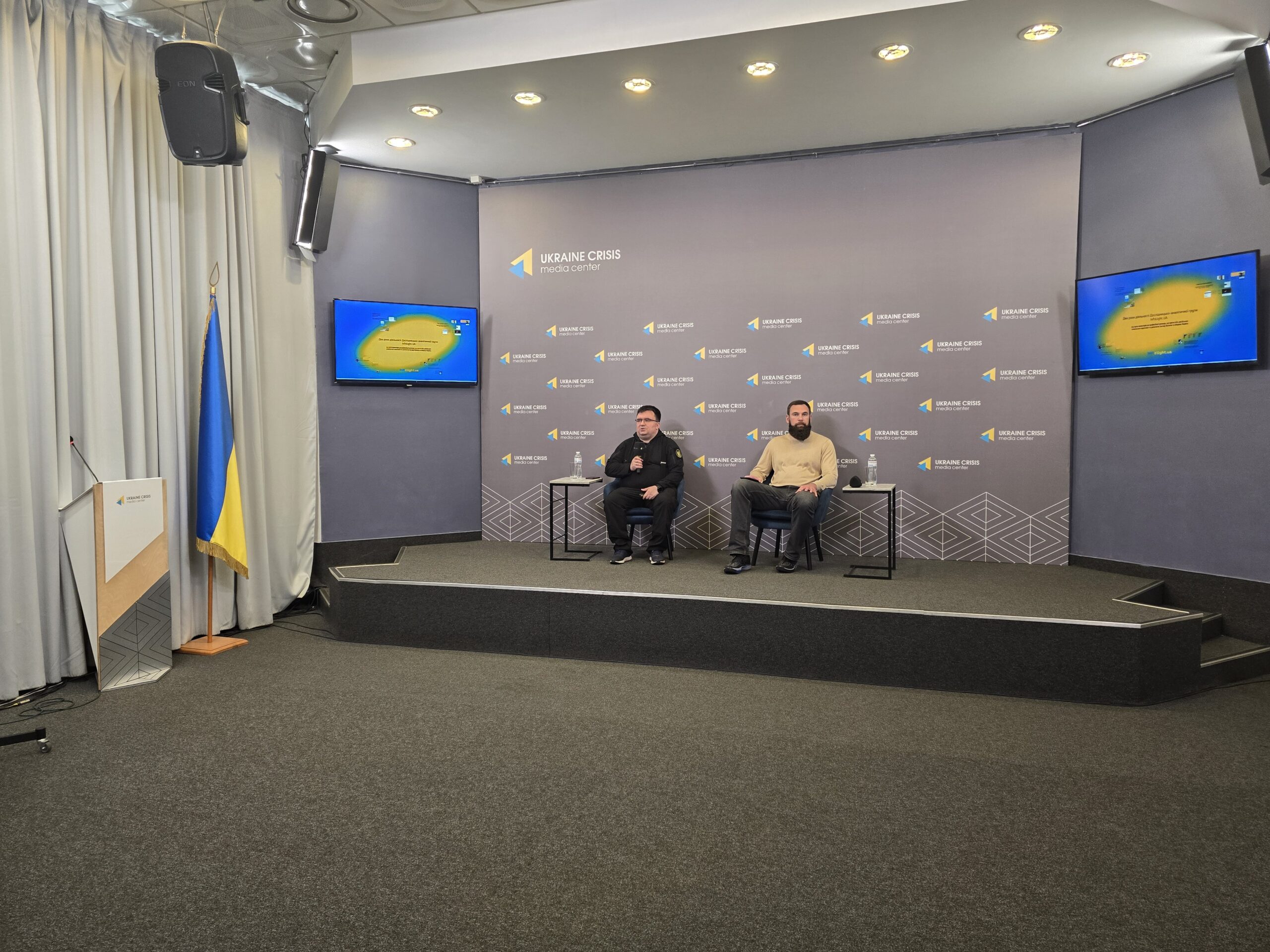On Wednesday, October 2, 2024, a presentation “Two Years of Countering Russian Disinformation: Achievements and Prospects of InfoLight.UA” was held at Ukraine Crisis Media Center in Kyiv. The event was organized by the NGO “Foundation for Promotion of Democracy“, which is the founder of the Research and Analysis Group InfoLight.UA.
Yuriy Goncharenko, head of InfoLight.UA, presented the history of the group, its transformation from a volunteer initiative to a professional team, and spoke about the support of the Hanns Seidel Foundation in the development of the project.
During the event, the team presented the monthly study “Top 40 Ukrainian Public Figures Quoted by Russian Propaganda“, which has been conducted since June 2024. Goncharenko emphasized the importance of this study for understanding the mechanisms of Russian propaganda and its impact on the Ukrainian information space. Its important feature is to identify the circle of Ukrainian public figures used by Russian propaganda for its own purposes.
“Some Ukrainian public figures unknowingly become an instrument of Russian propaganda, often just fulfilling their official duties. For example, if we talk about statements by representatives of the energy sector who warn of difficulties due to damage to critical infrastructure. However, we should not cross the line here, when regular repetition of warnings becomes intimidating.
But for our study, it is more interesting to look at those who generate news for hostile content out of nothing, literally out of thin air. The undisputed leaders here are Oleh Soskin, Oleh Starikov, and Oleksandr Dubinsky. Mariana Bezuhla and Serhiy Kryvonos are consistently on the front pages, and they can be called the favorites of Russian propagandists, as they regularly make relevant statements without formal grounds. Unfortunately, we also had to note the presence of such military figures as Ihor Lapin, who is regularly quoted in Russia, especially by RIA Novosti.” – said Yuriy Goncharenko, head of InfoLight.UA Research and Analytical Group.
Some of the team’s other successful fact-checking cases were also presented (there are more than 100 of them since the initiative’s inception):
- Identifying networks of counter-mobilization.
- A study confirming that there is no evidence of the identity of Telegram spokesperson Remi Vaughn.
- Refutation of the fake news about the launch of Tucker Carlson’s show on Russia 24 in May 24.
- Refuting disinformation about the evacuation of Odesa region.
- Exposing the fake about the preparation of a coup by Zaluzhnyi and Budanov
“One of the tracks we are constantly monitoring is Russian influence in provoking and creating conflicts among the military and political leadership. Recently, for example, there has been a lot of information about the allegedly planned resignation of Kyrylo Budanov. And in this context, I would just like to remind you that a little less than a year ago, there was a large-scale provocation involving the world media in which Budanov assassinated Zelensky and seized power in February 2024.
Therefore, you can see for yourself how well the forecasts coincide with reality. The day before yesterday, Roman Kostenko, the secretary of the Verkhovna Rada Committee, said that there were no questions about Budanov as the head of intelligence. And this is what I would take as a basis in this situation.” – Yuriy Goncharenko said at the event.

Special attention was paid to the use of neural networks to counter malicious Russian narratives. The InfoLight.UA team presented the results of cooperation with the Osavul platform, which uses artificial intelligence to assess the information environment.
Stanislav Lurie, representative of Osavul, spoke about the platform’s capabilities and prospects for the development of AI technologies in the information security sector:
“Our tool uses artificial intelligence to detect organized information campaigns. We can distinguish synthetic publications/messages from natural ones, which is a tool for analyzing the information space.
We allow you to analyze the sources and chains of messages end-to-end, across different types of channels, languages and countries of distribution, which allows you to make analytical conclusions about the organization of this information or what”

InfoLight.UA also presented an analytical study “Russian Expansion Machine: Doctrinal, Informational and Foreign Policy Aspects”, which reveals Russia’s strategies in the information war against Ukraine.
The article highlighted InfoLight.UA’s cooperation with the Security and Defense Sector of Ukraine and the Spilnok.News project.
At the end of the event, the team announced some future activities:
- Expanding educational activities through online and offline training
- Production of information security manuals and brochures
- Development of the technological base and research methodology
InfoLight.UA also announced a new project – the creation of a rating/community of “small” media, primarily regional and frontline media, which were offered support in fact-checking, including free trainings, distribution of their materials to increase coverage and visibility, and to become participants in the “Independent Media Rating.”
“In fact, our team itself encounters difficulties in the media we want to support. However, thanks to our partners, we have a little more capacity and will be happy to help everyone who needs it,” explained the head of InfoLight.UA. Anyone who wants to join the community of independent media is invited to write a motivational and descriptive letter to [email protected], after which the InfoLight.UA team will get in touch and start a partnership.
The event concluded with a discussion of the prospects for the development of Ukraine’s information security and the role of civic initiatives in this process.
The event took place on October 02 at 14:00 at Ukraine Crisis Media Center (2 Khreshchatyk St.).
Broadcast (on UCMC channel): https://www.facebook.com/uacrisis.ua/videos/2941425606007515/
The InfoLight.UA research and analysis group is a project implemented by the NGO Democracy Support Foundation with the support of the Hanns Seidel Foundation in Ukraine.


Leave a Reply